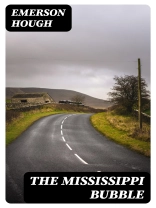In ‘The Mississippi Bubble, ‘ Emerson Hough explores the intertwining narratives of greed, ambition, and disaster during the speculative frenzy surrounding the Mississippi Company in the early 18th century. Hough’s narrative intertwines meticulous historical research with vibrant storytelling, creating a seamless tapestry that captures the turbulence of this period. The book not only sheds light on the economic collapse that tarnished the dreams of countless investors but also serves as a cautionary tale about the perils of unchecked ambition and the folly of blind speculation. Hough employs a dynamic literary style filled with rich descriptions and sharp dialogue, drawing readers into a world where fortunes were made and lost overnight. Emerson Hough was a prominent American author and journalist known for his deep engagement with the American landscape and its history. Born in 1857, Hough’s firsthand experiences with the changing socio-economic conditions of his time undoubtedly influenced his decision to pen this work, guiding his exploration of human motivations underlying financial ventures. His skillful blending of adventure and history reflects his broader literary pursuits, emphasizing both individual and societal narratives. ‘The Mississippi Bubble’ stands as an essential read for anyone interested in early American history, financial crises, or the intricacies of human nature. Hough’s compelling prose invites readers to reflect on the echoes of history that resonate in contemporary economic practices, making it a timeless cautionary tale. This book will not only enrich your understanding of a significant historical event but will also inspire critical thought about the impact of greed and ambition in our own lives.
Circa l’autore
Emerson Hough (1857–1923) was an American author best known for his historical novels and stories set in the American West. Born in Newton, Iowa, Hough graduated from the University of Iowa with a degree in philosophy in 1880 and later studied law, which he practiced for several years before turning to a career in writing. His literary works often blend adventure with historical accuracy, reflecting his keen interest in Western American history.
One of Hough’s most celebrated works is ‘The Mississippi Bubble’ (1902), a historical novel that explores the speculative frenzy surrounding John Law and his economic schemes in early 18th-century France and the subsequent development of the Mississippi Valley. This book displays Hough’s narrative prowess and deep understanding of the economic and social transformations of the period. His other notable works include ‘The Covered Wagon’ (1922), which was a significant contribution to the Western genre, and ’54-40 or Fight’ (1909), which deals with the Oregon boundary dispute between the United States and Great Britain.
Hough’s works are characterized by meticulous research and vivid storytelling, earning him a reputation as a writer who could distill complex historical events into compelling narratives. His contribution to early 20th-century literature, particularly in the Western and historical fiction genres, remains valuable to both literary scholars and general readers interested in this transformative era of American history.












